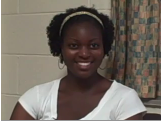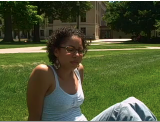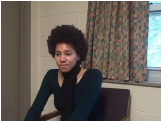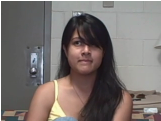Navigation:
Video Segment 2: What were your parents' attitudes toward literacy and/or education?
Video Segment 3: How would your life be different if you didn't know how to read and write?
Video Segment 4: What is your experience with and attitude toward computers?
Lessons 1 & 2: Narrating Technology Use
Lesson 3: Technology Resistance
Lesson 4: Complexity of Technological Engagements
Working Definitions of Technological Literacy and Narrative Analysis
- Chanelle Mays Transcript
- Saffiyah Madraswala Transcript
- Viktoriya Kamara Transcript
- Anne Jacobs Transcript
What is your experience with and attitude toward computers?

(the video will pop up when the image is clicked)
Anne Jacobs
Video Transcript

(the video will pop up when the image is clicked)
Chanelle Mays
Video Transcript

(the video will pop up when the image is clicked)
Viktoriya Kamara
Video Transcript

(the video will pop up when the image is clicked)
Saffiyah Madraswala
Video Transcript
All four women state that computers have been a significant presence in their lives. For Jacobs and Mays, computers seem relatively uncomplicated. They are there for work or play--conducting research online, checking email, or writing a paper. Kamara seems both nonchalant about computers and also displeased with what she sees them doing to communication (speed is killing creativity). Madraswala articulates a conflicted relationship to computers. She describes them as a means to an end, but declares that she hates "all forms of non human-to-human interaction." Still, she explains how useful the speed of email was while she was in the Philippines. Her strong contradictions are intriguing. One gets the impression she might be negotiating different value sets, none of which she is entirely attached to.
In their research on the cultural ecologies of literacy, Hawisher and Selfe define effective electronic literacy by drawing on Catherine Hobbs' definition of effective literacy: "a level of literacy that enables one to effect change in her own life and society" (Hobbs, 1995, p. 1). In this set of interviews, all of the women talk about their parents as sponsors of computer literacy because they purchased computers even if they did not see the value of becoming computer literate for themselves. All of the young women value technology particularly as an aid to their research. None of them place as high a value on technology for its communicative ability, and Kamara and Madraswala portray themselves as particularly hostile to communication technologies because they are once removed from human-to-human contact. At the same time, all of these young women, particularly Madraswala, present themselves as possessing effective electronic literacy that allows them to change their own lives and society.
It is important to note how normalized life with computers is for all these women. All of them describe using computers as early as elementary school and seem particularly accepting of how useful computers are for school work, which includes researching and writing papers, while excluding the use of computers for entertainment an communication. This narrow definition of productive use for school work alone limits how positively any of the women can portray their own computer usage, whether they are chatting online or watching television on their computers. In other words, a gap appears to exist between how they perceive their use of computer technologies and how they report their use of computer technologies.